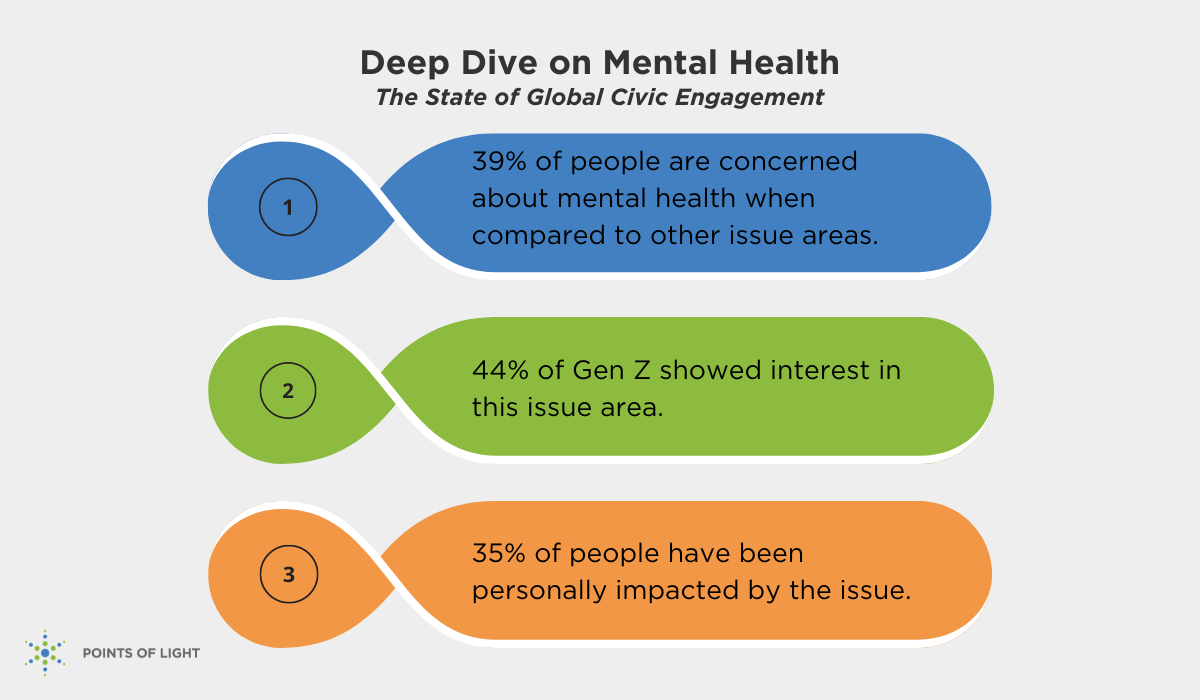Leverage These 10 Research-based Facts and Stories of Inspiration to Drive Change

Content Warning: Points of Light is proud to share the following information; however, we acknowledge that these issues may be difficult for some readers. We encourage you to please care for your own well-being above all.
Mental health, COVID-19, gun safety and domestic violence have all come to the forefront of conversations about overall health. These cause areas affect everyone, from students and employees in workplaces to professional athletes and entertainers to healthcare workers themselves.
When cause areas like these come into focus, equipping social impact professionals and everyday people with research is one impactful way Points of Light can honor our commitment to civic engagement. Research can help you understand the current needs and concerns of people in your community so you can develop an action plan to meet those needs.
Here are 10 research-based facts about mental health, safety and issues related to both, along with stories of everyday people driving change in their communities around these causes. With this compelling research and these inspiring stories, we hope you’ll feel equipped to drive real and sustained change in your own community.
10 Research-Based Facts about Mental Health, Domestic Violence, Gun Safety, and COVID-19
1. Thirty-nine percent of people are concerned about MENTAL HEALTH when compared to other issue areas.
Of the respondents, Gen Z showed the highest concern about mental health issues at 44%, with Millennials following closely at 42%, Gen X at 40% and Baby Boomers at 31%. This generational breakdown may reflect the increase in conversation and education around mental health over the past few decades, becoming a less taboo topic for younger generations.
2. Thirty-five percent of respondents said they have been personally impacted by mental health issues.
Typically, people are most moved to action when they experience the impacts of a specific issue. While this might mean a personal lived experience, often people can access empathy when a loved one has been impacted.
3. Eighty-three percent of people chose to respond to this issue through VOLUNTEERING.
Volunteering is one of nine elements of the Points of Light Civic Circle® and represents one of the most powerful ways to lend hands-on support for a cause. Nonprofit organizations rely on their volunteers to help drive their missions forward and stretch donor funds as far as possible. When it comes to mental health, respondents said they volunteered their time and talent either by intentionally helping someone else or volunteering with an organization, whether in-person or online.
See how servicewoman Michaela White is advocating for mental health in the military.
4. Fifteen percent of people are concerned about GUN SAFETY when compared to other issue areas.
This statistic reflects a drastically lower level of interest when compared to the broader topic of mental health. This could reflect the fact that fewer people are personally impacted by gun violence when compared to mental health, but it could also reflect the charged political nature of conversations around gun safety. Interestingly, men and women showed equal concern about this issue at 15%.
5. Sixty percent of respondents took the time to learn about gun safety.
Listening and learning is another element of the Civic Circle and, for gun safety, is perhaps the most critical. Learning about a social issue can help educate you about the many nuances rather than having a “blanket” perspective on it. It can also help you make more thoughtful and informed decisions about how to approach solutions. People believe that some of the most helpful actions related to gun safety involve individual effort, like personal education on the issue and voting.
Read about high school student Yating “Tina” Tang who is lifting up the marginalized and combating gun violence through activism and art.
6. Thirty-two percent of women said DOMESTIC VIOLENCE was one of their top areas of concern, compared to 22% of men.
Domestic violence is another cause area with interest being driven by those most commonly affected by the issue – in this case, women. While men are certainly not exempt from domestic violence, women are considerably more likely to experience it. Thirty-four percent of respondents reported that a close friend or family member had been impacted by domestic violence, a statistic that could lend itself to increasing empathy and concern among all people, regardless of gender.
7. Sixty-eight percent of individuals took time to post and share content on their social media channels around the issue of domestic violence, while 63% intentionally helped someone affected by domestic violence.
See how Air Force member Matthew Storer is helping families escaping domestic violence to start anew.
8. Fifty-five percent of people are concerned about COVID-19 when compared to other issue areas.
Unsurprisingly, COVID-19 was one of the top-ranked issue areas in terms of concern. Since the COVID-19 virus, and the ensuing pandemic, affected every single person across the globe, it’s no wonder that many people showed the most interest in this issue.
9. Sixty-three percent of Baby Boomers cited COVID-19 as a top concern.
Since people over the age of 65 are more at risk of severe illness from COVID-19, it is clear why Baby Boomers, among all the generations, would be the most concerned about this issue. In contrast, 49% of Gen Z cited COVID-19 as a top concern, while Millennials and Gen X showed interest at 51% and 58%, respectively.
10. Seventy-nine percent of respondents made a donation to a COVID-related cause or organization.
Donate is another element of the Civic Circle, and encompasses contributions of money, services or goods to a cause. Since the landscape of the COVID-19 pandemic has largely moved from disaster response to recovery, it makes sense that individuals are choosing to donate to organizations responding to the crisis.
Read about public health employee Alyssa Antczak’s efforts to set up mass vaccination clinics and organize COVID-19 testing sites during the pandemic.
Want to keep diving? Take a look at these topics to find out how you can leverage our research to take civic action in your own community:
- 5 Ways to Champion Sustainable Practices With Points of Light Research
- The Path Towards Equity and Social Justice: Lessons Learned from Points of Light’s Global Research
- Listen and Learn from Our Research on Under-resourced Communities
- Key Takeaways on Education and Literacy Development from Points of Light’s Research



